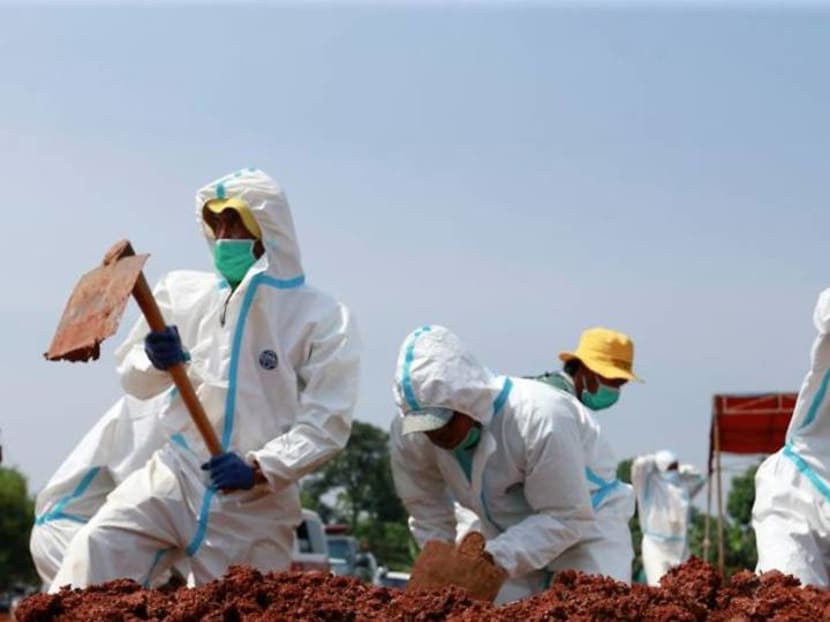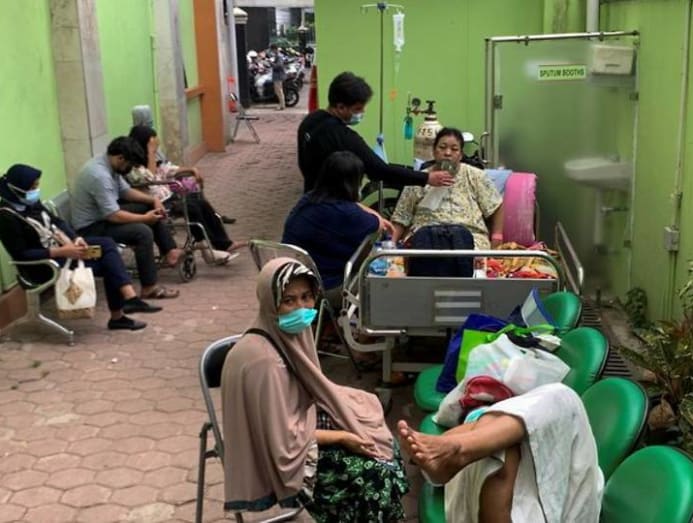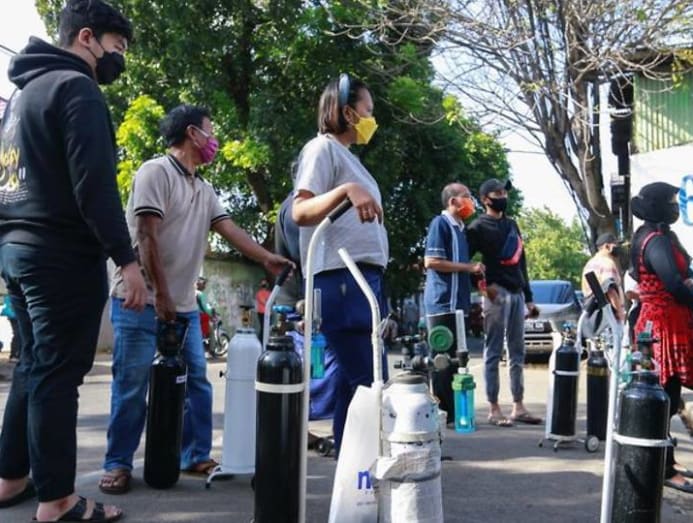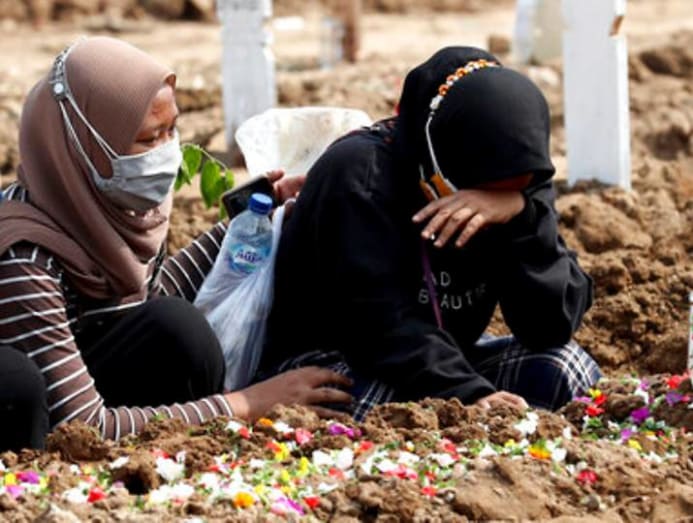As spike in COVID-19 cases taxes healthcare system, some Indonesians have little choice but to isolate at home

Gravediggers wearing personal protective equipment work at a cemetery in Bekasi, on the outskirts of Jakarta, Indonesia, Jul 8, 2021. (Photo: Reuters/Ajeng Dinar Ulfiana)
JAKARTA: Indonesian Rudi Zafar, 31, could barely breathe and walk at the end of June after testing positive for COVID-19.
Despite his weak condition, for days he went from one hospital to the other to seek medical treatment in his hometown Bekasi on the outskirts of capital Jakarta.
He even went to Jakarta but all hospitals were full and unable to admit him.
Mr Zafar’s oxygen saturation had dropped to below 90, but he had no choice other than staying at home.
His neighbours provided him with an oxygen tank, but he was still breathless.
“There was no progress. My chest still felt tight, and my saturation kept dropping to 85,” he told CNA on Jul 13.

Mr Zafar was one of many in Indonesia who have been diagnosed with COVID-19 but could not access treatment in the hospitals due to overcapacity.
As the country continuously clogged record-breaking COVID-19 caseload, many regions experienced an increase of more than 200 per cent cases.
READ: What might have caused the huge spike in Indonesia's COVID-19 cases post-Idul Fitri holiday
With more than 2.9 million COVID-19 cases and 77,500 deaths so far, Indonesia has overtaken India as Asia’s epicentre of COVID-19. On Wednesday (Jul 21), it reported 33,772 new infections and record-high 1,383 deaths.
Experts have expressed concerns that the actual caseload might be higher than the official numbers. They claimed that cases are not properly recorded and reported, and testing and tracing capacities remain limited.
Hospitals in Indonesia are almost full, said Dr Lia Partakusuma, secretary-general of the Association of Hospitals in Indonesia on Jul 5 in a hearing at the parliament, especially on Java island where the bed occupancy rate (BOR) of many hospitals has reached 90 per cent.
People have been urged to isolate at home unless they are severely ill. To ensure that people who are self-isolating at home still receive medical care, the government has launched free telemedicine services for patients with mild symptoms.
Patients who test positive for COVID-19 at a lab affiliated with the health ministry will receive a WhatsApp message which provides a link to the telemedicine service. Free medicine is also provided.
The programme has been launched in Greater Jakarta and will be extended to other areas, said the government.
Nevertheless, the response has been mixed with some finding it useful, but some complained that they did not receive a WhatsApp message from the health ministry.
There are also some who claimed that the WhatsApp message arrived days after they tested positive, which was too late.
HEALTH SYSTEM IS CREAKING
Indonesia’s latest COVID-19 spike came after Idul Fitri’s holiday in mid-May where people’s mobility was high as many returned to their hometowns despite a travel ban.
The government had anticipated a spike in COVID-19 cases and added up to 72,000 isolation beds, about 20,000 of which were already occupied before the holiday.
A total of 7,500 intensive care unit beds, of which around 2,000 were occupied before Idul Fitri, were also added.
READ: Fear, stress, relief: How CNA's Nivell Rayda tested positive for COVID-19 as cases spike across Indonesia
However, this year’s post-Idul Fitri COVID-19 cases spike is significantly higher than last year’s 60 per cent hike.
On May 13, the first day of Idul Fitri, a total of 3,448 daily COVID-19 cases were recorded. Two months later on Jul 13, the daily infections have multiplied by more than 13 times to 47,899.
The additional beds and the makeshift hospitals which the government had prepared filled up very quickly.

The surge in COVID-19 cases is a burden to Indonesia’s healthcare system, which even before the pandemic was relatively weaker compared to its neighbouring countries.
Prior to the pandemic, data from the World Bank showed that Indonesia has 1.2 hospital beds for every 1,000 people while Malaysia and Singapore have 1.9 and 2.4 respectively.
In a move to reduce pressure on the healthcare system, the government has said numerous times that patients with mild symptoms should not go to the hospitals and only people who meet certain criteria may be admitted.
“In particular those who have comorbidities, especially when their (oxygen) saturation is below 95 per cent and those who have started to feel short of breath, they should be taken to the hospital," said Health Minister Budi Gunadi Sadikin at a press conference on Jun 21.
ENDLESS SEARCH FOR HOSPITALS
But as hospitals are overwhelmed, even people who meet those criteria may not be admitted and have no choice but to isolate at home.
Mdm Kartini, 54, recently went through the ordeal of searching for hospital beds for her family members who tested positive for COVID-19.
Five of Mdm Kartini family members ended up self-isolating at home, since there were no hospital beds available and they did not experience major symptoms.
Their local health centre knew of their conditions and gave them a doctor's contact number.
At one point, Mdm Kartini's nephew, who is in his early twenties, started to feel breathless. The local health clinic tried to find a hospital for him, but to no avail.
"We contacted the doctor. She responded a few times but then she also contracted COVID-19 and became less responsive," said Mdm Kartini.
The family eventually found a hospital for the nephew after searching endlessly. "It was like being told you will receive a bonus and a salary increment," Mdm Kartini said of the relief and joy she felt at that time.
However, the oxygen saturation of the nephew's mother dropped to 76. After various attempts to find a hospital for her, they tried to take care of her at home with oxygen supplied by other family members.
READ: COVID-19 - Singapore to send regular shipments of emergency oxygen supplies to Indonesia
Meanwhile, the condition of her older sister deteriorated and she eventually passed away at home.
As officials were also handling other death cases, the family had to wait for six hours before officers arrived to bury the deceased.
"Self-isolating does not mean it is safe. If a person must self-isolate, then the government or an agency must monitor the condition of the patient every day, if possible," Mdm Kartini said.
"Don't just take their hands off because not everyone can afford to hire home care, so there must be a mechanism from the government on how to monitor people every day. This is a cry for help," she added.

Across Java island, long queues were seen at oxygen centres when people rushed to buy oxygen for their family members who have tested positive.
These oxygen centres, which are mostly run privately, sell oxygen tanks as well as oxygen supply for a refill.
Mr Sadikin, the health minister, said on Jun 25 that there was sufficient oxygen supply on Java island. In Early July, dozens of patients died at a hospital in Yogyakarta after it ran out of oxygen supply.
Coordinating Minister for Maritime affairs and Investment Luhut Pandjaitan said at a press conference on Jul 5 that oxygen distribution was hampered due to threefold to fourfold increase in demand and asked oxygen producers to fully dedicate their supply to medical needs.
“I have been to two other places, they were all out of stock,” said Mr Faisal, a newly recovered COVID-19 patient, when met at an oxygen centre in Jakarta on Jul 8.
He wanted to purchase oxygen supply for his parents, who were down with COVID-19 and whose oxygen saturation was below 90.
Mr Faisal chanced upon the oxygen centre online. It was still closed when he arrived but he decided to wait and try his luck.
Indonesia has since received oxygen concentrators from Singapore and Australia has also said it would send oxygen concentrators and cylinders.
DEATHS AT HOME A GROWING CONCERN: NGOs
Self-isolating at home without proper healthcare and supervision has led to cases of people dying at home, according to non-governmental organisations.
Jakarta-based health think tank Center for Indonesia’s Strategic Development Initiative (CISDI) reported that in West Java province, more than 400 COVID-19 patients died in the first week of July while isolating at home.
"The total number of patients who died in self-isolation in the last seven days was 446 people,” said CISDI’s founder Diah Saminarsih at a virtual press conference on Jul 12.
Meanwhile, LaporCovid-19, a coalition of citizens from various backgrounds and institutes such as the Indonesian Legal Aid Foundation (YLBHI) and Indonesia Corruption Watch (ICW), recorded 740 deaths at home between June and Jul 21 in 16 provinces. All of the deceased were COVID-19 patients.
“This is only what we have found. Searching for this death rate is like searching for bodies or victims of a landslide. It is all buried, so we have to do some searching first,” said LaporCOVID-19's data coordinator Said Fariz Hibban.
He revealed that among the deaths were elderly people who died alone at home while isolating and the neighbours only discovered their deaths a few days later.
READ: Concern grows over Indonesia's regions as Delta COVID-19 variant ravages Java
While the Indonesian health ministry has no data on the number of COVID-19 patients who died at home, the head of disease prevention and control at Jakarta’s health agency Dr Dwi Oktavia told CNA that for the past few weeks, the city has buried about 300 deaths with COVID-19 health protocols every day.
The figure included 30 to 40 daily deaths at home.
“This is the condition we have seen in the last few days. Maybe not everyone (who has died) has tested for COVID-19, but at the time of death, the doctor or health worker conducts an interview, especially with the family members who know the deceased's illness history.
"So, if we suspect it is COVID-19, we will bury the body according to the standard COVID-19 protocol," Dr Oktavia told CNA.

It is thus important that when a person falls ill, someone should immediately notify the head of the local neighbourhood unit, she added.
Mr Zafar, who was eventually hospitalised and discharged about two weeks later, has only one message: "Don't take COVID-19 lightly. Adhere to the health protocols, don't underestimate the disease as if you don't believe it exists."
"Previously, I didn't believe it existed, but after I experienced it myself, I have changed 90 degrees. It was in my body, the X-ray of my lungs showed my lungs were white. Don’t underestimate it, adhere to health protocols and keep a distance."
BOOKMARK THIS: Our comprehensive coverage of the coronavirus outbreak and its developments
Download our app or subscribe to our Telegram channel for the latest updates on the coronavirus outbreak: https://cna.asia/telegram





